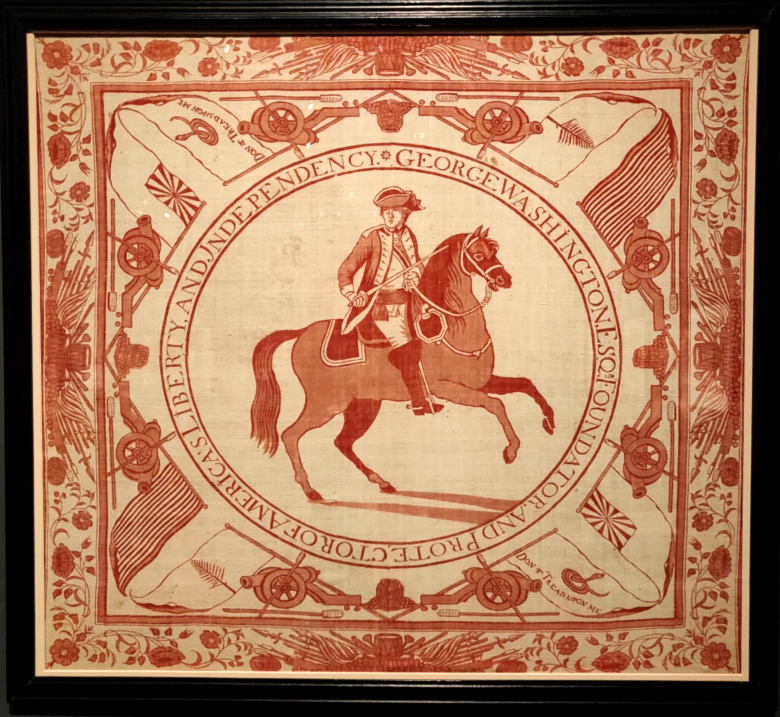BOOK REVIEW: Seized with the Temper of The Times: Identity and Rebellion in Pre-Revolutionary America by Abby Chandler (Westholme, 2023)
In the past fifteen years or so, there has been, happily, an explosion of books published on battles and other military aspects of the American Revolutionary War. In the same time frame, far fewer books have been published addressing political developments in the decade prior to 1775 that led to war. As we approach the 250th anniversaries of the Battles of Lexington and Concord and the Declaration of Independence, more of the latter types of books are needed.
 Abby Chandler’s excellent Seized with the Temper of The Times: Identity and Rebellion in Pre-Revolutionary America helps to close the gap. It deals with two lightly populated colonies, Rhode Island and North Carolina. But both colonies have a fascinating history in the years from 1764 to 1775.
Abby Chandler’s excellent Seized with the Temper of The Times: Identity and Rebellion in Pre-Revolutionary America helps to close the gap. It deals with two lightly populated colonies, Rhode Island and North Carolina. But both colonies have a fascinating history in the years from 1764 to 1775.
Chandler’s book is a reminder that while the imperial crisis with Britain was front-and-center, each colony also had its own unique political and economic dynamics and tensions. This was case with North Carolina in particular. The Regulator Rebellion spanning from 1768 to 1771 was one of the outstanding conflicts in the thirteen colonies prior to the Battles of Lexington and Concord. Rhode Island saw internal divisions arise from the Ward-Hopkins political controversy, but unlike in North Carolina, the two sides eventually came together to oppose British policies.
The Regulator Rebellion arose from tensions between the elites in eastern North Carolina and recent settlers in the hills of the western part of the colony. Many of these settlers participated in the Regulator movement. The most important complaints were the shortage of cash in western North Carolina, which was needed to pay taxes, and the steep fees (which also needed to be paid in cash) charged by sheriffs, judges and other officials, many of whom were associated with eastern elites. The Regulators filed petitions with the colony’s General Assembly, but they went unaddressed. The Royal governor, William Tryon, dissolved the Assembly, hoping to forestall organized opposition in the colony to the Stamp Act. Finally, frustrations grew into military conflict. The Regulator Rebellion was crushed at the Battle of Alamance in 1771 and some Regulators were hanged for treason. Chandler astutely points out that while some historians have tried to argue that the Regulator Rebellion was a harbinger of the American Revolution, in fact, most of the those who opposed the Regulators would support the patriot cause, and many of the Regulators would become Loyalists.
While Rhode Island was a small colony, it had a vibrant maritime economy based in a substantial part on illegal trading with French and Dutch colonies in the Caribbean. It also imported much molasses from British colonies that was distilled into rum, with most of the rum sold to New Englanders, but some was used by Newport slave traders to purchase captives on the West African coast. Rhode Islanders felt threatened by Parliament’s attempts to regulate trade and to impose taxes, starting with the Sugar Act of 1764 and followed by the Stamp Act in 1765.
Chandler focuses her discussions of Rhode Island on the Stamp Act protests. Earlier violent protests in Boston had resulted in the sacking and plundering of Lieutenant Governor Thomas Hutchinson’s impressive home. (Hutchinson’s draft manuscript on the history of early New England was also destroyed, a true loss for historians). The Sons of Liberty in Newport focused their attention on the Newport Junto, a group of well-to-do men who supported Crown rule. These men made the unfortunate decision to draft a petition intended to persuade London officials to terminate Rhode Island’s charter that allowed the colony to be self-governed and to replace the elected governor with an appointed Royal governor. Nothing could have enraged Rhode Island patriots more than this effort. The focus of the patriots’ ire fell on Newport Junto members, including Martin Howard, who would eventually flee the colony.
One of my favorite quotes in Chandler’s book is from a leader of Newport’s Sons of Liberty, Samuel Vernon. In response Martin Howard’s claim in a pamphlet that many of Newport’s merchants flouted British customs laws, Vernon bloviated, “Such a claim warrants a death sentence.” Howard’s claim was entirely accurate and well-known, so it is not clear why Vernon spoke in such harsh terms.
Chandler also nicely fills in the frequently-overlooked Rhode Island history between the Stamp Act crisis in 1765 to the Battles of Lexington and Concord in April 1775. She summarizes the violent attack and destruction by Rhode Island patriots of the Royal Navy revenue cutter Gaspeeat Namquit Point off Warwick, as well as lesser-known incidents, such as the burning in Newport of John Hancock’s sloop Liberty, which had been seized for suspected smuggling by the British customs officials and employed by them in chasing other suspected smugglers.
In addition, Chandler fills in the time in North Carolina from the Battle of Alamance in 1771 to the outbreak of rebellion in 1775. Neither William Tryon, nor his successor as governor, Josiah Martin, were able to prevent the Patriot cause from growing and thriving in eastern North Carolina. The outbreak of war forced Martin to flee from his New Bern mansion for the safety of a Royal Navy warship.
I applaud the author’s decision to write a dual colonial history, one on Rhode Island and the other on North Carolina. A book on any one of them might get bogged down in too many details for many readers. Instead, the author efficiently addresses both colonies, and the book is still short at 144 pages (not including the thorough footnotes).
Fortunately for Chandler, following his quick exit from Rhode Island, Martin Howard wound up being appointed as a judge in North Carolina and would serve there during the Regulator Rebellion. With the imperial crisis heating up, as was the case with Governor Martin, Howard fled to safety on board a Royal Navy warship. (Chandler points out that both Howard and Martin showed some sympathy for the continuing demands of the Regulators, thereby further alienating patriots in the eastern part of the colony).
In fact, as Chander recently explained in an interview with JAR, she had originally intended to write a biography of Howard, but it was rendered impractical because Howard died in exile in London in 1781, leaving behind very few documents explaining his thought processes. So Chandler switched to studying the political developments in the two colonies in which Howard resided, Rhode Island and North Carolina.
Chandler notes that Rhode Island and North Carolina have some commonalities. In addition to being overshadowed by larger and wealthier neighbors, they were two of the most tolerant of the thirteen colonies, permitting a wide diversity of religions to practice unfettered by government authority.
Also fortunate for Chandler, Rhode Island was the last of the original thirteen colonies to join the new United States, while North Carolina was second-to-last. Chandler does not delve into the unique reasons why that was case in great detail, but the very fact that that was the case, she points out, shows the independent spirit of both former colonies.
Chandler attempts to show that many ties existed between Rhode Island and North Carolina, but in truth there were not many. Rhode Island had many more ties with South Carolina, primarily due to Rhode Island’s role as the leading slave trading colony among the thirteen mainland colonies and South Carolina’s role as the leading buyer of African captives. By comparison to South Carolina, North Carolina had many fewer enslaved persons, including on a per capita basis. Still, the lack of extensive ties between North Carolina and Rhode Island does not detract from the book.
Chandler also argues that Rhode Island’s Dorr Rebellion demonstrated the colony’s rebellious spirit. But that conflict occurred in the early 1840s, some sixty-five years after the Declaration of Independence. Further, its causes were rooted in the state sticking to its colonial laws requiring men to own a certain amount of property before they could vote, in a new age when many Irish immigrants and others worked in textile mills and in cities and were not landowners.
Still, Chandler’s new book is a most welcome addition to the study of colonial North America, and I highly recommend it.
PLEASE CONSIDER PURCHASING THIS BOOK FROM AMAZON IN HARDCOVER or KINDLE. (As an Amazon Associate, JAR earns from qualifying purchases. This helps toward providing our content free of charge.)









One thought on “Seized with the Temper of the Times: Identity and Rebellion in Pre-Revolutionary America”
Christian, that is an excellent, thought-provoking review! I agree that more books should be written about the Colonial era political developments that devolved into armed conflict. Chandler’s compare-and-contrast style is well worth contemplating. Her arguments that the colonies had unique politics and interests are more compelling than her stated similarities between Rhode Island and North Carolina. However, Chandler’s well-researched micro-analysis adds more to our understanding than the broad, sweeping generalities in many books on pre-independence politics. Her conclusion that pre-war politics in Rhode Island and North Carolina demonstrates Revolutionary Era dissent and union are two sides of the same coin is a call for additional scholarship.